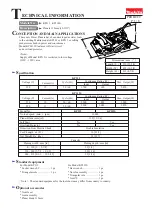
51
2: Relaxed NMEA format checking. Normally the multiplexer only passes sentences when they are
correctly formatted: starting with a ‘$’ or a ‘!’ and ending on a CR/LF pair.
When this mode is selected, an NMEA sentence will be passed if it starts with a ‘$’ or a ‘!’ and
ends on a CR or a LF or a combination of both in arbitrary order.
A sentence with a checksum error is blocked.
3: Accept plain text strings as input and forward them in $MXTXT sentences. Any character with
an ASCII value > 32 (a space) is considered to be the start of a string. The string must end on
a CR or LF and may not be longer than 61 characters. A longer string is discarded. Only valid
NMEA characters are passed. Invalid characters are stripped from the input data.
The Total number and Sentence number fields are always set to ‘01’. The Text Identifier field of
the $MXTXT sentence contains the input number on which the text was received. When for
instance ‘Hello World’ is received on input 3, the resulting sentence will be:
$MXTXT,01,01,03,Hello World*6E
4: Accept plain text strings as input and forward them in $PTXT sentences. Any character with an
ASCII value > 32 (a space) is considered to be the start of a string. The string must end on a
CR or LF and may not be longer than 61 characters. A longer string is discarded. The
multiplexer will always end a forwarded string with a CR/LF pair.
All characters with an ASCII value from 32 to 127 are passed.
5: Accept plain text strings as input and forward them as plain text. Any character with an ASCII
value > 32 (a space) is considered to be the start of a string. The string must end on a CR or
LF and may not be longer than 61 characters. A longer string is discarded. The multiplexer will
always end a forwarded string with a CR/LF pair.
All characters between from ASCII 32 to 127 are passed.
6: SeaTalk to NMEA conversion on input 4 only. When this mode is selected, the $PSMDOP
response will show option 3 enabled. Any other mode (0..4) will clear both SeaTalk options in
the $PSMDOP response.
$PSMDLDR – Loader message
This sentence is output by the bootloader on the host interface. It contains the loader version and
multiplexer ID. The loader will wait for a special key during 0.2s after sending this sentence. When no
key is received, the multiplexer application code is started. If no application code is found, the loader will
continue sending this sentence.
Format: $PSMDLDR,xx,v.v,zzz
xx: Hardware ID of the multiplexer (a hexadecimal number)
v.v: Bootloader version number
zzz: Hardware name of the multiplexer
The following hardware ID’s and names are defined:
01: MPX-S (board with RS-232 interface)
02: MPX-U (board with USB interface)
03: MPX-E (board with Ethernet interface)
04: MPX-W (board with USB and WiFi interface)
When bit 7 of the hardware ID is set, e.g. 81, the board has a Bluetooth module installed.
Example: $PSMDLDR,82,1.2,MPX-U
This multiplexer has a MPX-U board with a USB interface and a Bluetooth module installed and the
bootloader is version 1.2.
$PSMDOP – Set Options
This sentence is used to enable or disable various options.
Format: $PSMDOP,a,o,e*hh<CR><LF>
or:
$PSMDOP,a,xxxxxxxx*hh<CR><LF>
a:
Sentence Status flag:
R = sentence is a status report of current settings
C = sentence is a command to change settings
o:
option number
e:
0 = off/disable
1 = on/enable










































